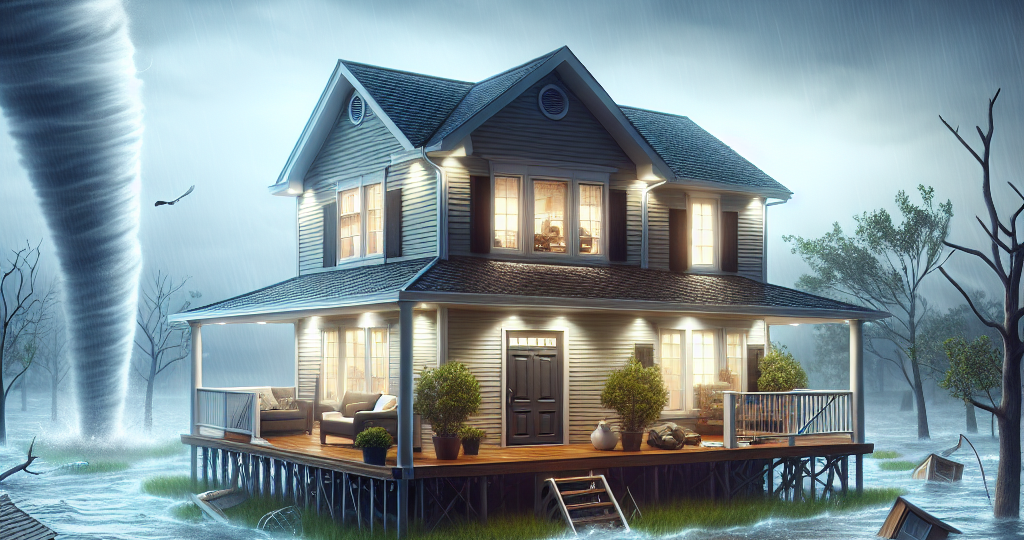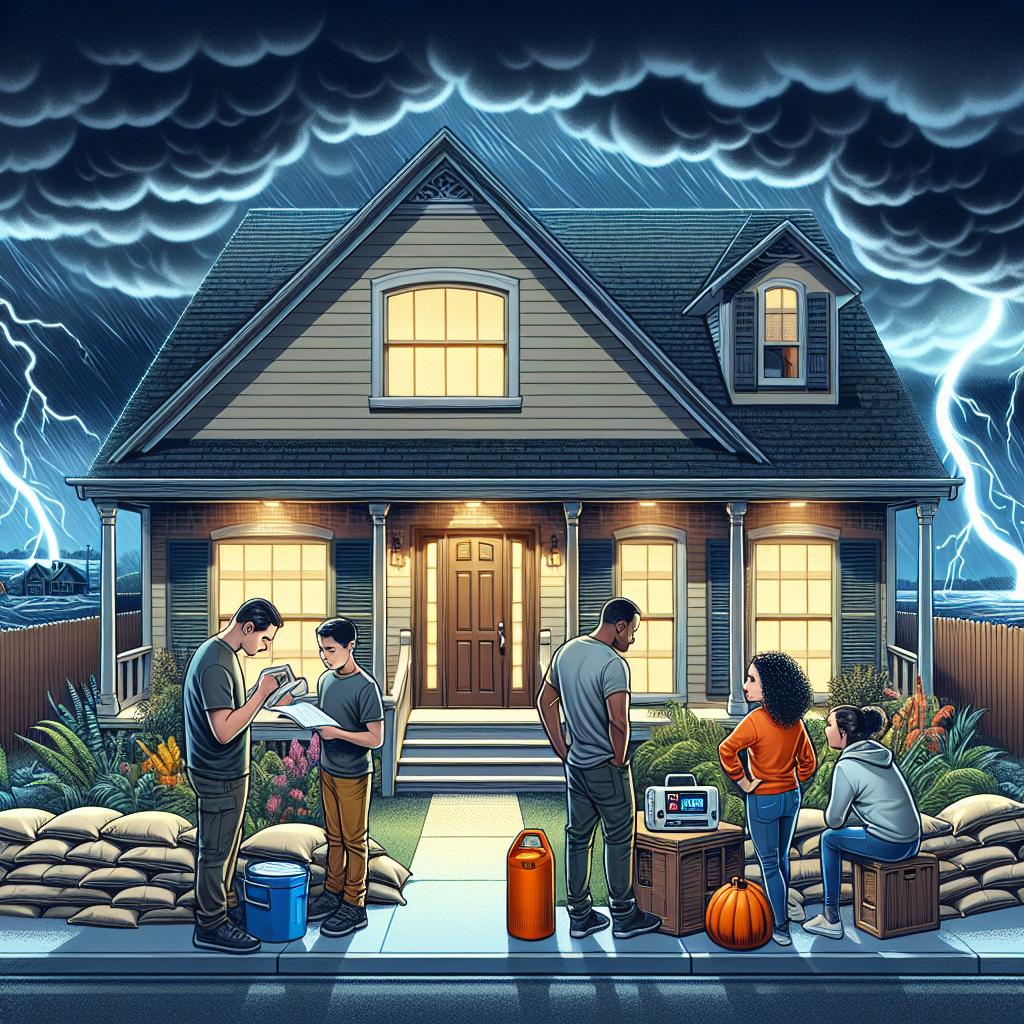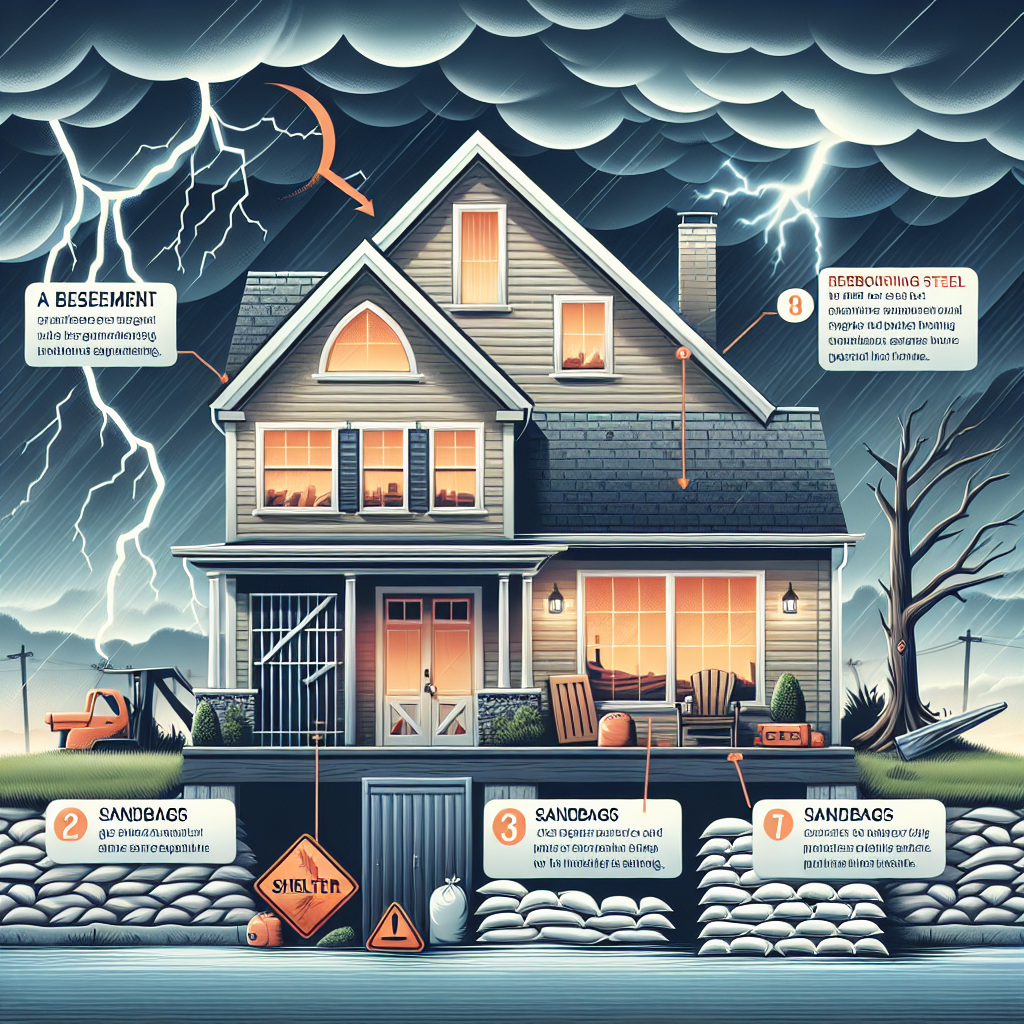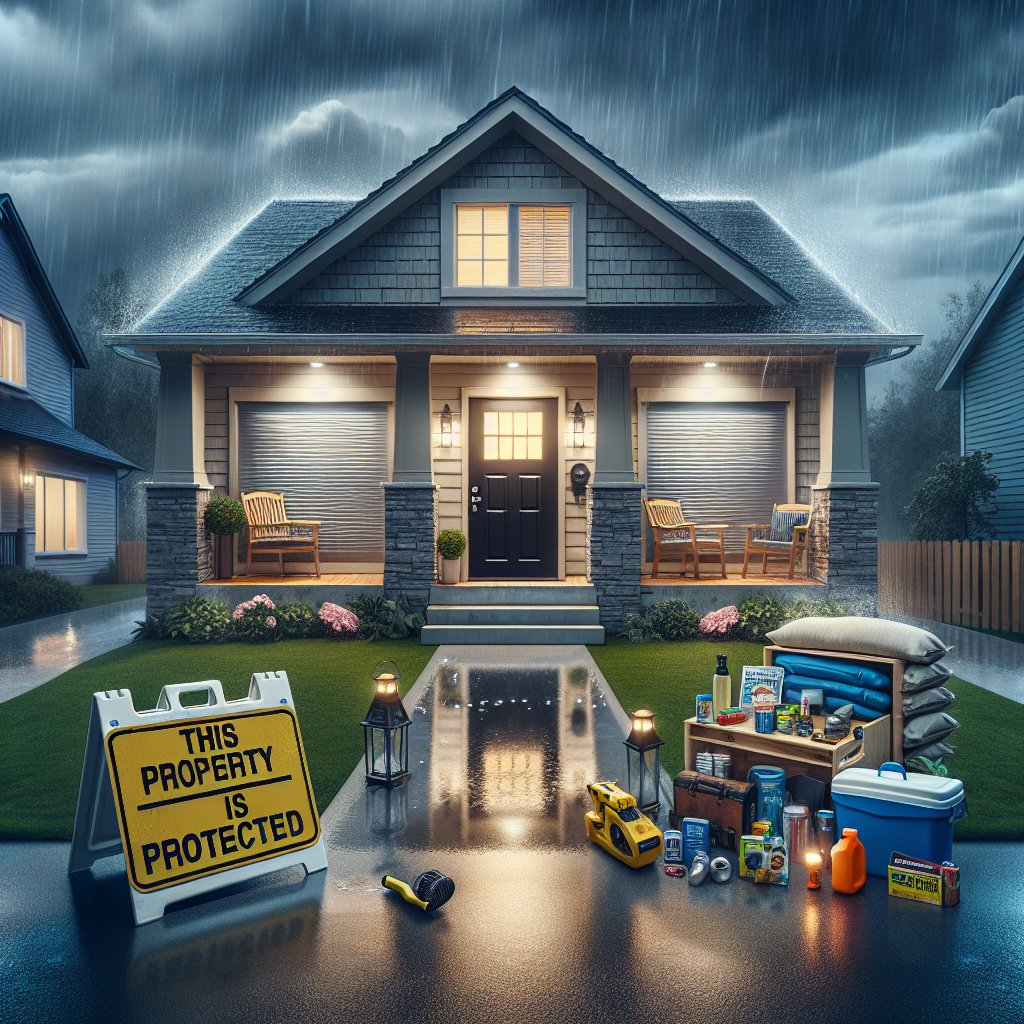Home Security Tips During Natural Disasters
September 13, 2024 | by Carol Sanders

Home is where we feel safe and secure, but during natural disasters, our sense of security can be challenged. From hurricanes to earthquakes, there are various natural disasters that can pose a threat to our homes and loved ones. It’s crucial to be prepared and have a plan in place to ensure the safety of your home and family during these unforeseen events. In this article, we will provide you with valuable home security tips to help you stay safe and secure during natural disasters. By following these tips, you can protect your home and loved ones from potential harm and minimize the risks associated with such emergencies.
Understanding Natural Disasters and Their Impact on Home Security
Natural disasters come in various forms, from hurricanes and tornadoes to earthquakes and wildfires. Each type of disaster poses unique challenges and threats to home security. Hurricanes, for example, can bring strong winds that can damage windows and doors, making it easier for intruders to enter the home. Earthquakes can cause structural damage to homes, weakening their integrity and making them more vulnerable to break-ins. Wildfires can destroy homes entirely, leaving them open to looting and vandalism in the aftermath.
During natural disasters, the chaos and disruption can lead to a breakdown in law enforcement and emergency services, leaving homes more exposed to criminal activity. Power outages are common during disasters, disabling security systems and lighting, which can make homes an easy target for burglars. Communication breakdowns can also hinder the ability to call for help or alert authorities to suspicious activity.
Being aware of the specific risks posed by different types of natural disasters is crucial in developing a comprehensive home security plan. Preparation is key to mitigating the impact of disasters on home security. By taking proactive steps to secure the home and fortify its defenses, homeowners can better protect their property and loved ones during times of crisis.
Preparing Your Home Before a Natural Disaster Strikes

Securing Windows and Doors
When preparing your home for a natural disaster, securing windows and doors is crucial to protect your property and ensure the safety of your family. Here are some detailed steps to follow:
-
Installing impact-resistant windows: Consider upgrading to impact-resistant windows that are designed to withstand strong winds and flying debris during hurricanes or tornadoes. These windows are made with laminated glass that is less likely to shatter upon impact, providing an additional layer of protection for your home.
-
Reinforcing door frames and hinges: Strengthening the door frames and hinges can help prevent them from being blown in or damaged during a storm. Consider installing heavy-duty deadbolts and strike plates to reinforce the entry points of your home. Additionally, using longer screws to secure hinges can make doors more resistant to strong winds.
-
Using storm shutters or plywood to protect windows: Installing storm shutters or pre-cut plywood panels over windows can provide an extra layer of protection against flying debris and strong winds. Make sure to have these materials readily available so you can quickly secure your windows before a natural disaster strikes.
Protecting Your Home’s Exterior
- Trimming trees and shrubs to prevent damage
- Before a natural disaster strikes, it is crucial to trim any overhanging branches or overgrown shrubs near your home. This helps prevent potential damage from falling limbs or debris during high winds or storms.
-
By keeping trees and shrubs well-maintained, you reduce the risk of branches breaking off and causing structural damage to your home. Regular pruning can also improve the overall health and longevity of your landscaping.
-
Securing outdoor furniture and decorations
- Outdoor furniture, decor, and other loose items in your yard can become hazardous projectiles during a natural disaster. Secure these items or bring them indoors to prevent them from being picked up by strong winds and causing damage to your property or neighboring homes.
-
Consider using anchors, straps, or weights to secure larger items like patio furniture, umbrellas, and grills. Store smaller items such as garden tools, decorations, and planters in a secure location like a shed or garage until the threat has passed.
-
Checking and reinforcing the roof for stability
- Inspecting your roof for any signs of damage or weakness is essential in preparing for a natural disaster. Look for missing or damaged shingles, loose flashing, or areas where water could potentially penetrate during heavy rain or wind.
- Reinforce vulnerable areas of your roof by securing loose shingles, repairing damaged flashing, and reinforcing connections between the roof and the rest of the structure. Consider consulting a professional roofer for a thorough inspection and any necessary repairs before disaster strikes.

Essential Home Security Measures During Natural Disasters
Creating an Emergency Plan
Establishing a comprehensive emergency plan is crucial to ensuring the safety and security of your home during natural disasters. By following these key steps, you can be better prepared to handle any unforeseen events:
-
Establishing Evacuation Routes: Identify multiple evacuation routes from different areas of your home, considering various scenarios such as wildfires, floods, or earthquakes. Ensure that all family members are familiar with these routes and practice them regularly to minimize confusion during an emergency.
-
Designating a Meeting Point for Family Members: Choose a designated meeting point outside of the home where all family members can gather in case of evacuation. This could be a nearby park, a neighbor’s house, or any other location that is easily accessible and safe. Make sure everyone knows the exact location and understands the importance of meeting there during a crisis.
-
Stocking Up on Essentials: Prepare an emergency kit that includes an ample supply of food, water, medications, and other essential items to sustain your family for at least 72 hours. Consider including items such as flashlights, batteries, a first aid kit, and important documents in a waterproof container. Regularly check and update the contents of your emergency kit to ensure that everything is in working order and not expired.
Utilizing Technology for Monitoring
Essential Home Security Measures During Natural Disasters
Incorporating technology into home security measures during natural disasters can greatly enhance preparedness and response efforts. Leveraging various tools can provide real-time monitoring and alerts, offering peace of mind even in challenging situations.
-
Installing security cameras for remote monitoring: One effective way to enhance home security during natural disasters is by installing security cameras. These cameras can be strategically placed both indoors and outdoors to monitor any suspicious activity or potential threats. In the event of a disaster, having access to live camera feeds remotely can help homeowners assess the situation and take necessary actions to protect their property.
-
Investing in smart home security systems: Smart home security systems offer advanced features that can be invaluable during natural disasters. These systems can include sensors for detecting smoke, fire, or flooding, as well as the ability to remotely control locks, lights, and alarms. Integrating these smart devices into a cohesive security system enables homeowners to receive instant notifications and automate responses based on the situation at hand.
-
Setting up alerts for weather-related emergencies: Weather-related emergencies are often unpredictable, making it crucial to stay informed in real-time. By setting up alerts on smartphones or smart home devices, homeowners can receive timely notifications about incoming severe weather conditions. These alerts can range from thunderstorm warnings to tornado watches, allowing individuals to take necessary precautions and secure their homes before disaster strikes.

By embracing technology for monitoring purposes, homeowners can proactively safeguard their properties and loved ones during natural disasters. Implementing security cameras, smart home systems, and weather alerts can significantly enhance preparedness and response capabilities, ultimately increasing overall safety and security.
Maintaining Home Security During and After a Natural Disaster
Power Outage Preparedness
During a natural disaster, power outages are common and can last for an extended period. To maintain home security during and after a natural disaster, it is crucial to be prepared for potential power disruptions. Here are some key tips for power outage preparedness:
-
Using backup generators or solar-powered devices: Investing in a backup generator can provide a reliable source of power during an outage. Solar-powered devices, such as solar chargers or lights, can also be invaluable for maintaining essential functions in the home.
-
Stocking up on flashlights, batteries, and candles: In the event of a power outage, having a supply of flashlights with extra batteries is essential for navigating the dark. Candles can also provide light, but remember to use them safely and never leave them unattended.
-
Unplugging electrical appliances to prevent damage from power surges: Before a natural disaster strikes, unplug sensitive electrical appliances to protect them from potential power surges when the electricity is restored. This precaution can help prevent damage and prolong the lifespan of your devices.
Securing Your Home Post-Disaster
After a natural disaster strikes, it is crucial to prioritize the safety and security of your home. Here are some essential steps to take in securing your home post-disaster:
- Checking for Gas Leaks or Electrical Hazards
-
Immediately turn off the main gas valve if you suspect a gas leak. Do not use any electrical appliances if there is standing water in your home as it poses a serious risk of electrocution. Contact your utility provider to inspect and address any gas or electrical issues.
-
Inspecting Structural Damage and Seeking Professional Help
-
Assess the structural integrity of your home for any visible damage such as cracks in walls, ceilings, or foundation. If you notice significant structural damage, evacuate the premises and seek assistance from a qualified building inspector or structural engineer to evaluate the safety of your home.
-
Documenting Any Losses for Insurance Claims
- It is essential to document all damages to your property by taking photographs or videos as evidence for insurance claims. Keep a detailed inventory of items that have been damaged or lost during the natural disaster to facilitate the claims process with your insurance provider.
Community Resources and Support for Home Security
Collaborating with Neighbors
Collaborating with neighbors is essential for enhancing home security during natural disasters. By working together, communities can strengthen their resilience and response capabilities. Here are some key ways to collaborate effectively:
-
Establishing a neighborhood watch program: Forming a neighborhood watch program can help residents keep an eye out for suspicious activities and potential security threats. By communicating regularly and sharing information about safety measures, neighbors can create a more secure environment for everyone.
-
Sharing resources and information during emergencies: During natural disasters, sharing resources such as food, water, and medical supplies can make a significant difference in ensuring the well-being of everyone in the community. Additionally, exchanging information about evacuation routes, shelter locations, and emergency contacts can help neighbors stay informed and prepared for any situation.
-
Supporting vulnerable community members in disaster recovery: It is crucial to look out for vulnerable community members, such as the elderly, disabled, or those with limited mobility, during and after a natural disaster. Collaborating with neighbors to check on their well-being, offer assistance, and coordinate support services can help ensure that everyone in the community is safe and secure.
Accessing Emergency Services
In times of natural disasters, being able to access emergency services promptly can be crucial for ensuring the safety and security of your home. Here are some key strategies to consider:
-
Knowing local emergency contact numbers: Familiarize yourself with the emergency contact numbers specific to your area, including police, fire department, and medical services. Keep these numbers stored in a readily accessible location, such as on the refrigerator or saved in your mobile phone.
-
Registering for alerts from local authorities: Many communities offer alert systems that provide real-time updates and warnings during emergencies. Sign up for these notifications through platforms like text alerts, email alerts, or smartphone apps to stay informed about potential threats and evacuation orders.
-
Participating in drills and training for disaster response: Take advantage of any training sessions or drills offered by local authorities or community organizations to prepare for natural disasters. Practice emergency procedures with your family members, such as evacuation routes, shelter locations, and communication protocols, to ensure a coordinated response in times of crisis.
FAQsHome Security Tips During Natural Disasters
What are some general home security tips to follow during natural disasters?
It is important to secure all windows and doors with sturdy locks or board them up with plywood to prevent potential break-ins during a natural disaster. Keep important documents, valuables, and medications in a waterproof and fireproof safe to protect them from damage. Have a communication plan in place with your family members or neighbors in case of emergencies.
How can I protect my home during a hurricane or tornado?
During a hurricane or tornado, it is essential to reinforce your windows and doors with storm shutters or plywood. Trim any loose branches or trees that could potentially fall and cause damage to your home. Consider investing in a generator to have access to power in case of outages, and always have an emergency kit with essentials such as food, water, and first aid supplies.
What steps can I take to secure my home during a wildfire?
To protect your home during a wildfire, create a defensible space around your property by clearing away flammable debris and vegetation. Install mesh screens over vents and openings to prevent embers from entering your home. Keep your gutters and roof clean of leaves and debris that could easily catch fire. Have an evacuation plan in place and be prepared to leave your home if authorities issue evacuation orders.
How can I safeguard my home during a flood?
Before a flood, elevate your appliances, electrical outlets, and important documents to prevent water damage. Seal any cracks or openings in your home’s foundation to prevent water from seeping in. Consider investing in a sump pump to remove excess water from your basement. Have a plan to turn off your utilities in case of flooding to prevent further damage to your home.
How to Protect Yourself From Thunder and Lighting ? Safety Tips | Both Outdoors and Indoors.
RELATED POSTS
View all

